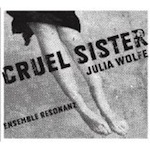|
|
 |
Dusted Reviews
Artist: Julia Wolfe Album: Cruel Sister Label: Cantaloupe Review date: Jul. 12, 2011 |

|
|
|
 |
Julia Wolfe has never made what could be called pleasant music. Of the three main composers in Bang on a Can — Michael Gordon and David Lang are the others — Wolfe is the most consistently confrontational, often challenging her listeners to process extreme volume, timbre and repetition. Her preferred method is to take masses of sound and make them grate against one another, collide, explode, and then reform into something new. In the setting of the Bang on a Can All-stars who love to disrupt the “norm” through amplification, noise and unusual instrumentation, her compositions come off as blasts of focused aggression that often leave the audience confused. To use a horribly inadequate analogy, if Lang and Gordon could be thought of as making krautrock, Wolfe would be early Sonic Youth. (To extend this analogy some, Magnus Lindberg would be Einstürzende Neubauten, Helmut Lachenmann would be early Boredoms without the humor, Iannis Xenakis would be Merzbow, and Fredric Rzewski would be the Ex. This parlor game could go on forever.)
This album marks a bit of a departure for Wolfe: Both compositions are for string orchestra, a remarkably conventional ensemble in Wolf’s oeuvre. Most of Wolfe’s works tend to be for hodgepodges of instruments with the occasional string quartet or orchestral work thrown in. But the string orchestra is a different beast entirely. It’s nowhere near as limber as a string quartet and lacks the sonic range of the symphony orchestra. The closest she’s gotten was the Lost Objects project in which she, Lang and Gordon collaborated on a piece for Concerto Köln, a baroque ensemble, supplemented by a contingent from Bang on a Can and DJ Spooky. Those additions allowed her to avoid dealing directly with the historical connotations and sonic limits of the baroque. Here, there is no escaping the history of the ensemble. A string orchestra is a string orchestra regardless of what you do with it. And sadly, Wolfe doesn’t seem interested in doing all that much with it.
Cruel Sister (2004) is Wolfe’s retelling of an old English ballad of the same name. The ballad tells the tale of two sisters, one of whom kills the other over a suitor by pushing her into the sea. Minstrels find the dead body, make her hair into a harp, and end up playing at the other sister’s wedding. Wolfe uses neither the words nor the music of the original, choosing instead to delve into its mood and psychological drama. To do so, Wolfe has the different sections of the orchestra play dissonant, conflicting pulses and rhythmic cells that increase and decrease in density over the course of the work. It ends up sounding like an unrelenting version of Bernard Hermann’s score to Psycho with a minimalist twist.
The other work here, Fuel (2007), is the soundtrack to Bill Morrison’s film of the same name and deals on some level with the socio-political issues of fuel. Wolfe’s music swirls in continuous motion for its first 15 minutes, exploring the possibilities of one set of sonorities with occasional bursts of noise or quasi-romantic harmonies. Those harmonies then become a proper perpetuum mobile for the last third of the work, evoking Berg’s Lyric Suite, Bartók and Lutoslawski. The effect is suitably virtuosic, and the Ensemble Resonanz performs with a limber ease that stands in stark contrast with the frenetic music.
Both pieces use limited material, but neither does all that much with those materials. Both works are programmatic, and yet neither work seems to have much to do with their program. Both works are knots of unrelenting, unearned tension, which is something that string orchestras have done since Mozart. And the clashing rhythmic grids Wolfe employs don’t mean enough on their own to sustain music at the scale of these pieces. We’re 30 years into the post-minimal age, and its techniques are getting a bit stale when used on their own, as they are here.
By Dan Ruccia
|







